Link: http://www.huffingtonpost.co.uk/david-mcdougall/social-networks-mental-health_b_18448180.html
There’s increasing evidence that social media contributes to poor mental health, particularly in younger people. It’s hardly surprising. Endless streams of new content drip-feed dopamine to the brain, which then wants more of it. Constant notifications remind us that life is happening somewhere else. And we’re at the mercy of unregulated content creators, shaping our worldview with everything from political outrage and fake news, to unrealistic body-image and lifestyle comparisons. But it’s important to recognise the positive benefits too. Social media can be incredibly valuable by helping us with identity forming and self-expression. Staying connected builds stronger relationships with our closest friends. And the way people write and post – even the Instagram filters they use – can actually be used to predict the likelihood of depression. Reduce harm, increase wellbeing This opens the door to platforms that could help, rather than harm. What if social networks were designed to consider their impact? What if they took more responsibility for users’ wellbeing? Could we track our mental health the way we do physical health? Or count digital content ‘calories’ like nutritional calories? In a small team at Studio Output, we challenged ourselves to find ways to reduce the negative impacts of image-led social channels like Instagram. Using platform, interface and content design we aimed to create less addictive interfaces that are still entertaining. To empower people to control what they see more consciously. And to use data and feed algorithms to detect poor mental health, then adapt content to reduce it. A positive platform Simon Gunning, CEO of CALM (Campaign Against Living Miserably) says, “As platforms mature it would seem logical that they embrace the need for responsibility and that the industry would begin to align itself, and indeed compete, around protecting users’ health.” Our explorations helped us to identify what a more mindful social platform might offer. What do you think – could design make the difference? Eight thought-starters for creating a positive platform:1. Mindful algorithm A ‘mindful algorithm’ would consider mental health before serving content. It might look at human signals around stress, analyse past posting and interactions for signs of anxiety or depression, consider time spent online and the current time of day. Using this data it would select what to show in your feed, to improve emotional balance, promote close connections, mitigate over-use and encourage healthier sleep patterns.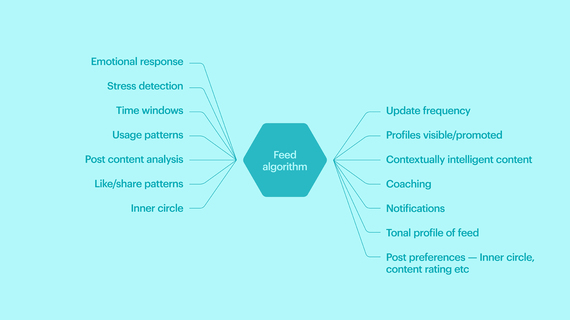 2. Intelligent coaching
If depression can be predicted from social content, platforms could respond with relevant coaching. Using content patterns, machine learning and analysis, we could develop a suite of content for coaching digital skills. Posted from the platform to users at potential risk, this would provide hints to develop skills, promote helpful features and foster healthy habits.
2. Intelligent coaching
If depression can be predicted from social content, platforms could respond with relevant coaching. Using content patterns, machine learning and analysis, we could develop a suite of content for coaching digital skills. Posted from the platform to users at potential risk, this would provide hints to develop skills, promote helpful features and foster healthy habits.
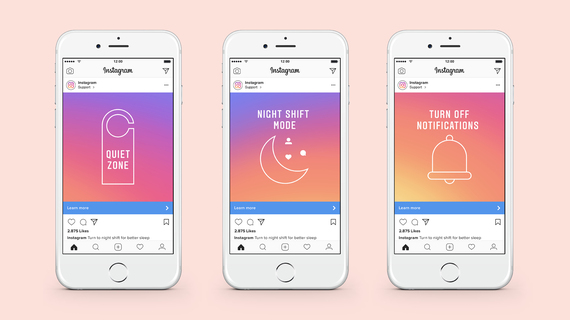 3. Profile health
We’re used to a traffic light system on food packaging, but what about social accounts? Could we develop a profile ranking system for feed ‘safe modes’, with accounts marked on a health scale? This would consider factors like posting cadence, engagement, photo-manipulation, sentiment, content reporting and body image – then tailor follow recommendations based on a balanced diet of content, not just subjective association.
3. Profile health
We’re used to a traffic light system on food packaging, but what about social accounts? Could we develop a profile ranking system for feed ‘safe modes’, with accounts marked on a health scale? This would consider factors like posting cadence, engagement, photo-manipulation, sentiment, content reporting and body image – then tailor follow recommendations based on a balanced diet of content, not just subjective association.
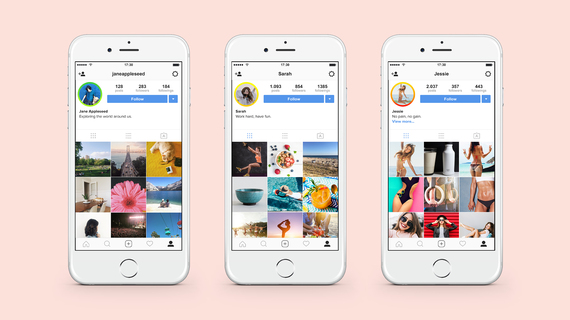 4. Inner circle
Research shows we can only hold close relationships with a small number of people. Social media helps to develop these connections, so why not help people prioritise posts from a small network of close friends? These would be given preference in feeds, helping to develop valuable, trusted relationships instead of mass follows.
4. Inner circle
Research shows we can only hold close relationships with a small number of people. Social media helps to develop these connections, so why not help people prioritise posts from a small network of close friends? These would be given preference in feeds, helping to develop valuable, trusted relationships instead of mass follows.
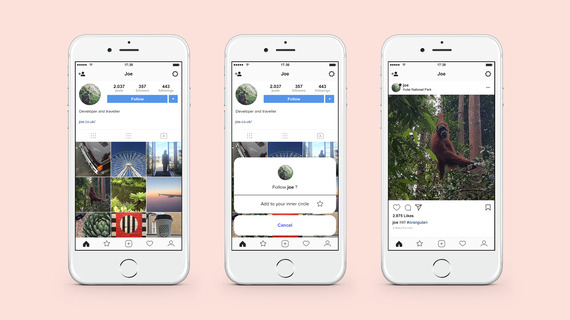 5. Smart notifications
Endless streams of content can be addictive – there’s always more out there, so we keep scrolling. Letting people digest and snooze notifications for a period of time could encourage less addictive behaviour, improve concentration and promote healthier interaction. Smart notification settings could be based on time of day, geo-fencing and sleep windows.
5. Smart notifications
Endless streams of content can be addictive – there’s always more out there, so we keep scrolling. Letting people digest and snooze notifications for a period of time could encourage less addictive behaviour, improve concentration and promote healthier interaction. Smart notification settings could be based on time of day, geo-fencing and sleep windows.
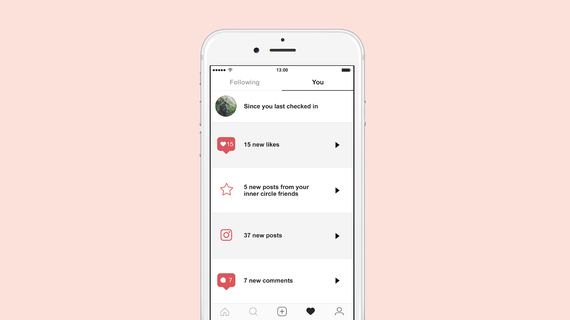 6. Activity tracking
If we monitor our fitness and generate physical health goals, why not do something similar for social media or screen time? An app or platform could set goals, monitor use and provide contextual tips to help us make more informed, healthy choices.
6. Activity tracking
If we monitor our fitness and generate physical health goals, why not do something similar for social media or screen time? An app or platform could set goals, monitor use and provide contextual tips to help us make more informed, healthy choices.
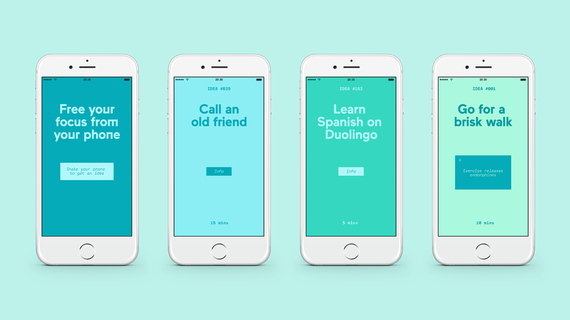 8. Safe feed
Everyone wants to take back control these days, so why not offer customised control of these settings at your phone’s operating system level? This would help people decide how social apps deliver content and features globally. It could show profile ratings, usage tracking, notification controls, ‘catch-up’ digests, quiet zones and a night shift mode.
8. Safe feed
Everyone wants to take back control these days, so why not offer customised control of these settings at your phone’s operating system level? This would help people decide how social apps deliver content and features globally. It could show profile ratings, usage tracking, notification controls, ‘catch-up’ digests, quiet zones and a night shift mode.
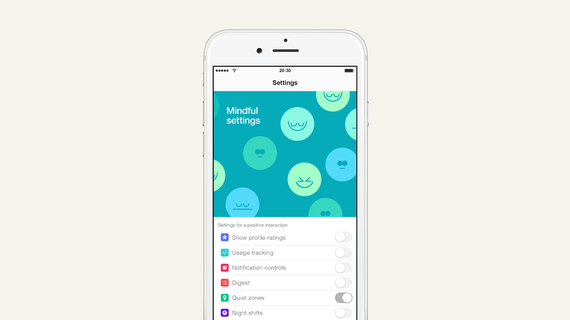 Read more about the experiment here.
Follow @StudioOutput on Twitter and Instagram.
Read more about the experiment here.
Follow @StudioOutput on Twitter and Instagram.